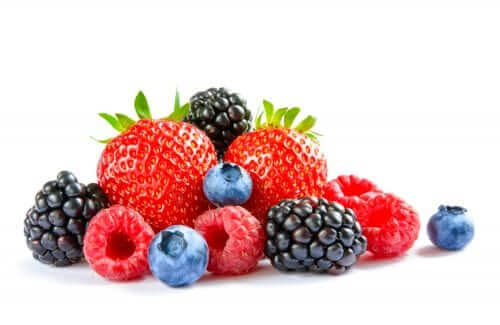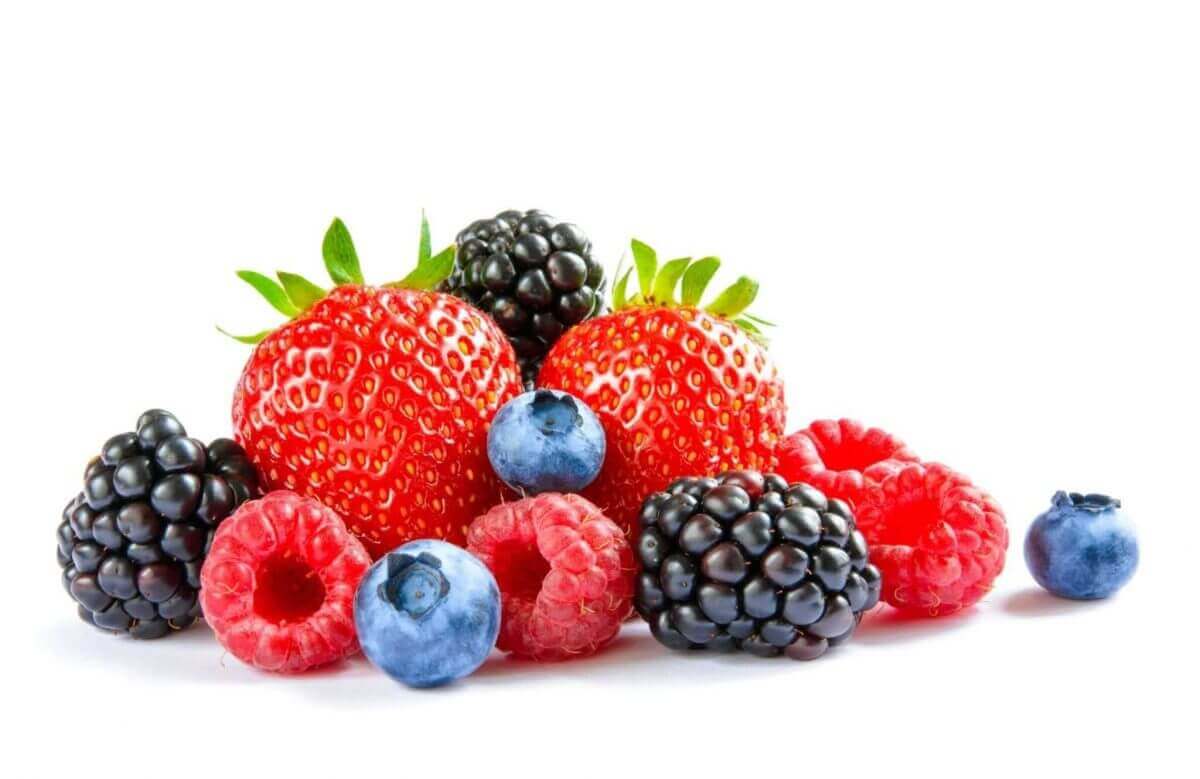There are numerous types of berries and fruits out on the market for purchase as whole food or even used as powdered extracts in herbal form. They have been touted for many years as being a vital part to our diet and health, but do they really provide benefits? Research indicates that making berries a part of your daily diet can stabilize blood sugar levels and improve diabetes control. Can a serving of blueberries in whole food form or even as part of berry extract herbal powder provide significant benefits towards improving your health? Let’s dive into it!

Blue, red, purples and even some yellow or off-green colors are typical for many berries and fruits. We are taught to ‘eat the colors of the rainbow’ and the colors found in the fruits or berries are reflective of phytochemicals called anthocyanins. In reality, most berries contain multiple biologically active compounds (BACs), including: phenolic acids, flavonoids (anthocyanins, flavonols) and tannins, but also contain variable amounts of vitamin C, some fiber, protein, low glycemic index carbohydrates and many other nutrients and compounds. They are also very low in calories! These BAC’s demonstrate significant antioxidant activity in research studies and multiple benefits to health. What we don’t know specifically, is whether if one of these compounds is directly responsible for their health effects or if it is a combination of all of them, working together? More than likely, knowing how foods work in general, it is the later of the two; meaning the sum is greater than the parts. As a whole, they are viewed as ‘functional foods’. (1)
Free Radicals, Oxidative Stress, Berries and Health
Free radicals and oxidative stress plays a major role in almost all health conditions in people, from cardiovascular disease, metabolic related disorders, allergies, joint degeneration, respiratory ailments, cancer and cognitive dysfunction. Free radicals are damaging chemicals produced within the body or taken in from the diet or environment, that inflict damage to cellular components (DNA) and contribute to abnormal function on many levels. Our bodies possess internal means of neutralizing free radicals and oxidative stress, but in cases of chronic exposure, the load can be overwhelming and exhaust our body’s capabilities. This is why it is vital to consume antioxidants from food and why many berries can be beneficial.
Many people take vitamins or antioxidant supplements, which may help, but sadly, most of these supplements are in the synthetic or isolated form. For example, we may consume vitamin C instead of acquiring that nutrient from whole food sources. This would be like saying you and consume vitamin C instead of eating an orange, achieving the same impact on health. By doing this, we may be missing out on the other biologically active compounds present in the food source and not take advantage of the synergism that occurs between them.
There are many fruits and berries available, but the ones in particular interest to me are strawberries, raspberries, blackberries, bilberry, noni fruit and blueberries. They are some of the most heavily researched and have similar capabilities when it comes to influencing health. For the sake of today’s article, we will be focusing on the research demonstrated health benefits of blueberries.
Blueberries, Other Berries and Health
Blueberries (genus Vaccinium) is noted as one of the fruits with the highest antioxidant capacity and natural levels of vitamin C. They are a rich source of numerous biologically active compounds, including flavonols such as Quercetin, which is by itself highly supported in research for health benefits. Blueberries have been shown to benefit the eyes and vision, bone health, insulin function and sugar regulation, which may benefit diabetes. They have also shown promise in the realm of breast, colon cancer, cardiovascular disease and atherosclerosis.(1)
These health benefits have been noted through the combined antioxidant and inflammatory modulating effects of the biologically active compounds present in the fruit. Blueberries are just one example and most other berries and fruits, demonstrate similar activities. We’ve talked about the impact of oxidative stress and inflammation on health in another article. The antioxidant and inflammation balancing effects from these berries is far reaching. Some just think of berries as good for our eyes or even skin, but in reality, they impact the entire body! Impacting not just one health concern, but potentially many!
One major area of concern is cardiovascular disease, which includes blood circulation and blood pressure.
In a study of post-menopausal women, evaluating blood pressure and arterial stiffness, the administration of 22 grams of a blueberry powder daily led to approximate 5% reduction in systolic blood pressure and improved arterial stiffness due to increased nitric oxide production after 8 weeks. (2). Blueberries were also found to reduce levels of oxidized DNA bases (free radical damage) and increase the body’s ability to resist oxidative cell damage in patients with cardiovascular disease.(3) In another study, supplementation of blueberry powder lead to reduced arterial stiffness, diastolic blood pressure and also an increased level of natural killer cells (NK), which may benefit immune function.(5)
Atherosclerosis is the condition in which our blood vessels lose their elasticity, become more rigid and tend to accumulate plaques internally, which then restrict blood circulation. The process of atherosclerosis is heavily connected not just to diet, but to the overall process of inflammation. Diets high in saturated and trans-fats are often implicated as the all-causal link to the problem, when in fact, it is what happens that is more important. Here lies the influence of inflammation and oxidative damage on fats and the subsequent response by the body. This is what leads to health problems and opens the door for cardiovascular disease. If we want to curb this process, we intervene through the diet and lifestyle modifications.
Blueberries, specifically the active compounds anthocyanins and phenolic acids, have been demonstrated to reduce lipid (fat) accumulation within macrophages. This may then transfer to benefits in reduction in atherosclerosis, especially when used routinely as part of a healthy diet. (4) In a study of obese men and women with metabolic syndrome, blueberry supplementation reduced blood pressure and levels of oxidized LDL lipids, which can both contribute to cardiovascular risk factors. (6)
In a final study to note, blueberries were shown to reduce damage to cardiomyocytes (heart cells) after myocardial ischemia or reduced blood flow to the heart. They was also evidence that blueberries could reduce susceptibility of cardiomyocytes to damage due to an ischemic event, such as a blood clot or plaque formation. (7)
Bottom Line Benefits of Blueberries
Blueberries are full of nutritive properties that can benefit your health in more ways that one. They are sources of macro- and micronutrients, but also potent phytochemicals that provide antioxidant and inflammatory balancing effects.
They have been shown to:
- Reduce cellular oxidative cell damage
- Improve arterial stiffness
- Reduce myocardial cell damage associated with myocardial infarction
- Improve blood pressure
- Improve overall circulation and cardiac health
These benefits transfer to other areas of our health from vision to blood sugar regulation, diabetes and even have implications in protecting against cancer events. In another article, we discuss berries and diet, and how they can impact blood sugar and diabetes.
The key here and one that is very important, is that they need to be a part of your DAILY regimen, often in combination with other fruits and berries, either in whole food or powdered extract form, in proper doses. Their intake provides benefits, but considering that our body is bombarded by free radicals daily, this equates to significant DNA damage. Daily consumption of berries is our best defense. If you experience blood sugar regulation problems, ongoing uncontrolled diabetes or other health conditions, berries may be a vital component to your diet. Make them a routine, a habit and reap the health benefits!
At Nouvelle Research, Inc. we offer many options to take advantage of this research to propel and enhance your health to the next level. Give us a call and find out how we can help!
Author: Tom Schell, D.V.M., CVCH, CHN
References:
- Skrovankova, S et al. Bioactive compounds and antioxidant activity in different types of berries. Int. J. Mol. Sci. 2015, 16,24673-24706.
- Johnson, SA et al. Daily blueberry consumption improves blood pressure and arterial stiffness in postmenopausal women with pre- and stage 1-hypertension. J Acad Nutri Diet. 2015. Mar;115(3):369-77
- Riso, P. Effects of wild blueberry drink intervention on markers of oxidative damage, stress, inflammation and endothelial function in humans with cardiovascular risk factors. Eur J Nutr. 2013. Apr; 52(3):949-61
- Del Bo, C. et al. Anthocyanins and phenolic acids from a wild blueberry powder counteract lipid accumulation in THP-1 macrophages. Eur J Nutr. 2016. Feb;55(1):171-82
- McAnulty, LS et al. Six weeks daily ingestion of whole blueberry powder increases natural killer cell counts and reduces arterial stiffness in sedentary males and females. Nutr Res. 2014. Jul;34(7):577-584
- Basu, A et al. Blueberries decrease cardiovascular risk factors in obese men and women with metabolic syndrome. J Nutr. 2010. Sep;140(9):1582-7
- Ahmet, l et al. Blueberry-enriched diet protects rat heart from ischemic damage. PLoS One. 2009. Jun 18;4(6):e5954



Great information. I love putting frozen berries in Greek yogurt with cinnamon.
Thank you for the info.
I’m a huge believer in your pure human Curost. Keep up the good work.
Tracey
Temecula CA
Thank you!
I know this article is about blueberries; however, Billberries where briefly mentioned. My full blood Friesian had a small cataract in one of its eyes. My holistic vet prescribed one tee-spoon of bilberries per day. I placed the billberries on the feed list and kept feeding it. About six months later there was no trace of the cataract.
Thank you for your post. Yes, bilberries are in the same group, full of antioxidants and anthocynanins, which are beneficial to the eyes and many other facets of the body. We offer a concentrated bilberry extract. https://curosthuman.com/index.php/product/bilberry-1-5-anthocyanins-extract-powder
VERY WELL WRITTEN AND WELL EXPLAINED ARTICLE, I HAVE ALSO MADE A WEBSITE ON BLUE BERRIES BUT YOUYR ARTICLE IS MUCH BETTER THAN MINE, FRANKLY SPEAKING